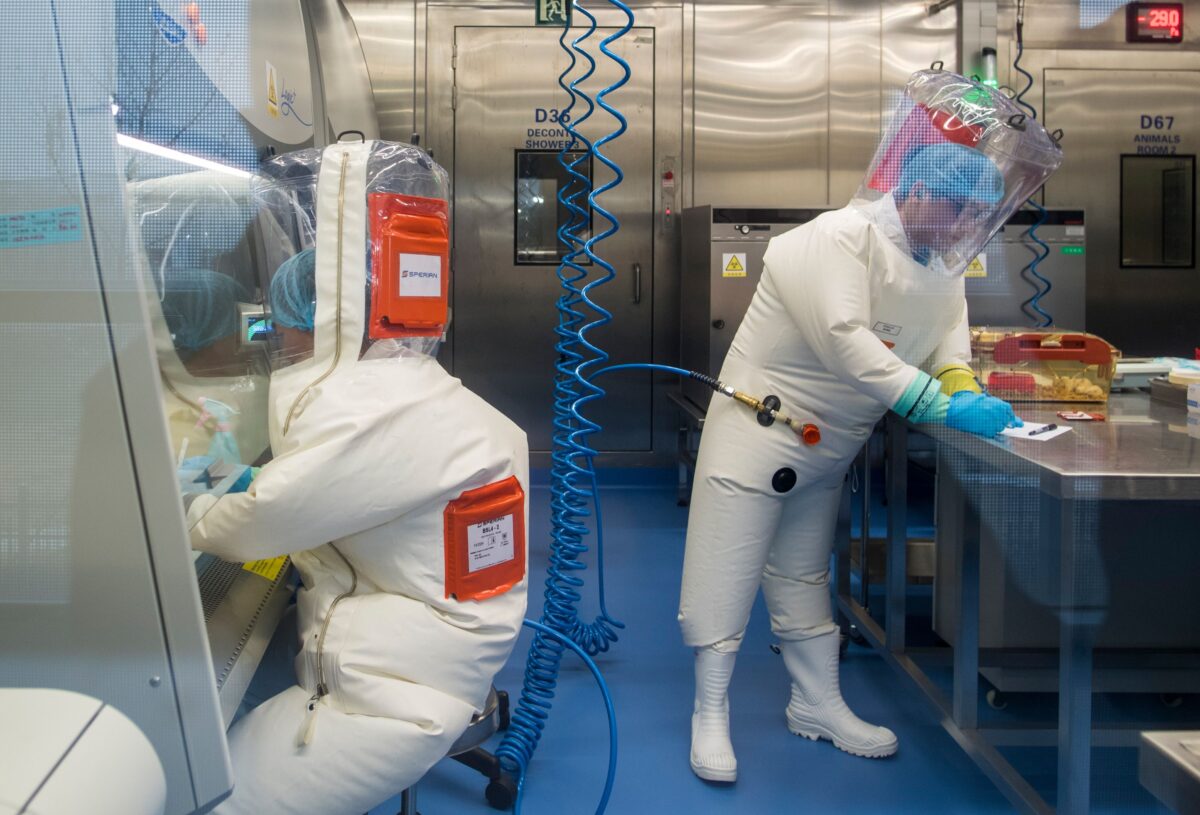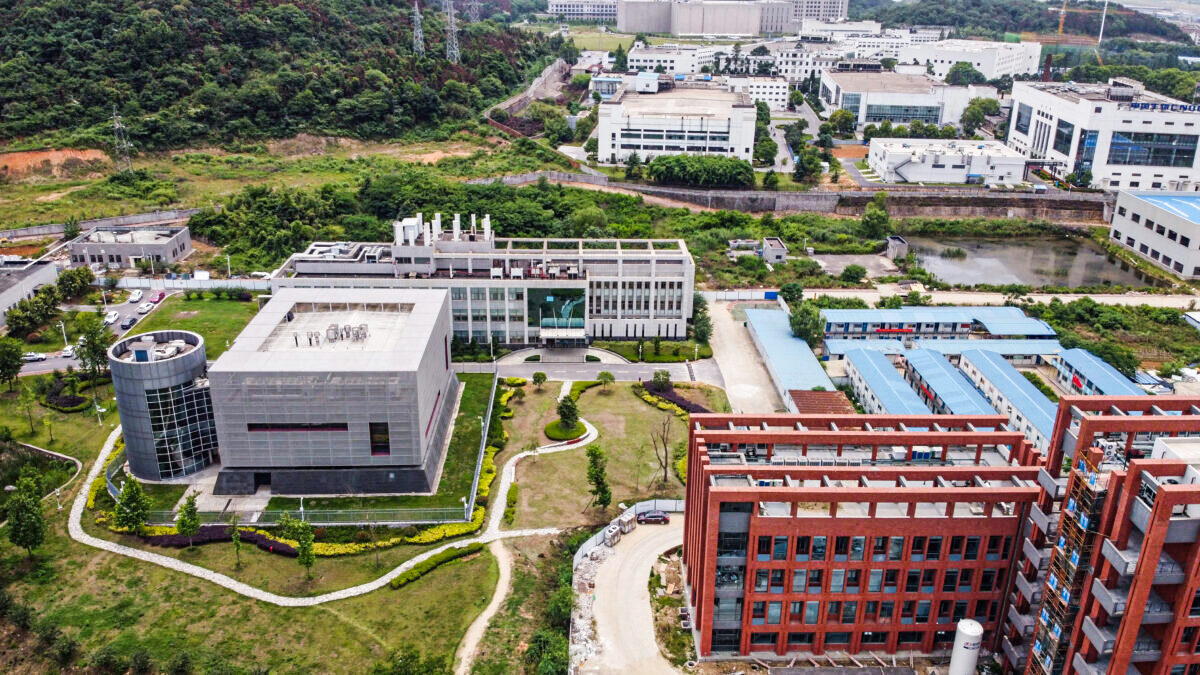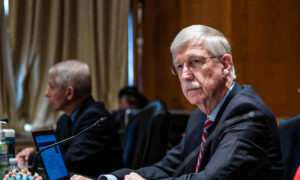ANALYSIS: NIH Leadership Was Deeply Anxious About Wuhan Lab Funding, New Emails Reveal
Top health officials also discussed how to “put down this very destructive conspiracy”
News Analysis
New National Institutes of Health (NIH) emails released under the Freedom of Information Act (FOIA) reveal the stark contrast between the public and private views of top NIH officials on the origin of the COVID-19 pandemic.
The new batch of FOIA emails, which was obtained by independent journalist James Tobias, shows a pattern of deception at the highest echelons of the NIH, including both its former director, Francis Collins, and current NIH Director Lawrence Tabak, who was previously Collins’s deputy.
The emails also show that when President Donald Trump cut funding to EcoHealth Alliance—the group through which the National Institute of Allergy and Infectious Diseases under Director Anthony Fauci funneled federal grant money to the Wuhan Institute of Virology (WIV)—a litany of organizations and individuals petitioned the NIH to keep the money flowing to EcoHealth. Those efforts ignored revelations on EcoHealth’s work with the controversial lab and instead focused on animosity toward Trump.
The emails also reveal that after Trump canceled EcoHealth’s Wuhan grant, Collins and Tabak discussed ways to reinstate the grant.
NIH Director Admits EcoHealth Problems
Perhaps the most significant revelation to emerge from the new FOIA emails is that the situation surrounding EcoHealth and its connection to Wuhan was causing NIH leaders a far bigger headache than their public pronouncements indicated.
In August 2020, Collins sent an email to Harold Varmus, one of his predecessors as director of the NIH, admitting that “this EcoHealth grant and its connection to Wuhan has presented one of the most difficult and wrenching situations of my 11 years as NIH Director. Most of that is not appropriate for e-mail.”
In the same email, Collins went on to say that there was “a lot more to this story than we have been able to talk about. Tony [Fauci] and I would like the chance to speak with you about this.”
Collins also wrote, “Meanwhile, and not because I completely buy its premises, I wonder if you have seen this article,” attaching a link to one of the first scientific articles to systematically lay out the case for a lab origin of COVID-19. Collins’s interest in scientific evidence for a lab leak stands in stark contrast to his public pronouncements both at the time as well as more recently.
This email had been previously released under FOIA but its contents were almost entirely redacted.
On Feb. 1, 2020, Collins participated in a private teleconference organized by Fauci that had the ostensible purpose of shutting down any discussion of a lab leak. In a Feb. 2, 2020, email to teleconference participants, Collins warned that not shutting down the lab leak hypothesis would do great harm to “international harmony.” In a blog post dated Mar 26, 2020, Collins dismissed contentions of a lab origin as “outrageous claims.” On Apr. 16, 2020, after Fox News ran a segment on the potential lab origin of COVID-19, Collins emailed Fauci and Tabak to offer his help to “put down this very destructive conspiracy.”

On May 7, 2020, Collins testified before the Senate Committee on Health, Education, Labor, and Pensions. Although the topics of EcoHealth and the origin of COVID-19 did not come up at the hearing, the new FOIA emails reveal that Collins had been briefed on possible answers in case they did. His briefing notes contained a reference to possible questions on EcoHealth’s failure to comply with federal rules. This is notable because Trump had canceled EcoHealth’s grant just twelve days prior to Collins’s Senate appearance.
Crucially, but unbeknownst to the public at the time, EcoHealth had failed to provide the NIH with two critical progress reports for its work at the WIV. Those reports covered the 2018 to 2019 timeframe in which COVID-19 might have been created at the lab. EcoHealth only provided these reports in 2020, more than two years after the 2018 report should have been filed, and only after FOIA requests for the reports were filed. In September 2021, the NIH finally released the reports pursuant to FOIA claims. The 2018 report revealed that the WIV had genetically engineered SARS viruses with novel spike proteins, which significantly increased viral load in humanized mice as compared to unaltered viruses. The COVID-19 virus also features a novel spike protein.
EcoHealth later blamed technical difficulties for its failure to submit the 2018 and 2019 reports. EcoHealth’s narrative is brought into question by the fact that the belatedly filed 2018 report contains a number of citations from 2019 and 2020, which did not exist at the time that EcoHealth allegedly tried to submit the report.
With respect to EcoHealth’s activity reports, Collins’s Senate briefing notes stated that “NIH requires grantees to submit a variety of reports which are due at specific times during the life cycle of a grant award. All reports must be accurate, complete, and submitted on time.” What the notes did not mention was that EcoHealth had failed to submit the two most critical reports that overlapped with the likely timeline of COVID-19’s creation.
Campaign to Keep Money Flowing to EcoHealth
The new FOIA emails also provide insights into the massive campaign undertaken by outside parties to reinstate EcoHealth’s grant.
Immediately after Trump canceled EcoHealth’s grant on Apr. 24, 2020, due to the close connections between EcoHealth and the WIV, a large number of parties, including individuals and organizations, started petitioning the NIH to reinstate the grant.
The petitions, which are included in the new FOIA release, originated with a wide variety of groups, including the Infectious Diseases Society of America, the HIV Medicine Association, the American Society of Tropical Medicine and Hygiene, the Pediatric Infectious Diseases Society, Climate Health Now, ICAP at Columbia University, the AIDS Foundation, and the Latino Commission on AIDS. Hundreds of individuals, many from universities, also petitioned the NIH to reinstate EcoHealth’s grant. The thrust of most of the petitions is that Trump capriciously revoked EcoHealth’s grant because he believed in the “conspiracy theory” that COVID-19 had come out of a Wuhan lab.
Seventy-seven Nobel laureates also stepped up to complain bitterly about the grant cancellation, claiming in a letter to Collins that “now is precisely the time when we need to support this kind of research if we aim to control the pandemic and prevent subsequent ones.” Their letter went on to explain that “[EcoHealth President] Dr. Daszak and his colleagues have been conducting highly regarded, NIH supported research on coronaviruses and other infectious agents, focusing on the transmission of these viruses from animal hosts to human beings.” Apparently, the 77 Nobel laureates were oblivious to the copious academic literature—which was widely available at the time—describing EcoHealth’s extensive involvement in gain-of-function experiments at the WIV.
Seven members of Congress, Reps. Joseph D. Morelle (D-N.Y.), Sheila Jackson Lee (D-Texas), Steve Cohen (D-Tenn.), Jan Schakowsky (D-Ill.), Seth Moulton (D-Mass.), Diana DeGette (D-Colo.) and Nydia M. Velázquez (D-N.Y.) also petitioned Collins to reinstate EcoHealth’s grant, which they claimed was canceled because Trump believed in a “conspiracy theory.” They further claimed, “The necessity for this work is clear, now more than ever. EcoHealth Alliance has been receiving federal funding since 2014 to study the risk of bat coronavirus emergence—the specific global health emergency we now face.” Apparently, these members of Congress were unaware of the possibility that it was EcoHealth’s work that caused the global health emergency.
In another letter that called on Collins to reinstate the grant, Reps. Eddie Bernice Johnson (D-Texas), Frank Pallone (D-N.J.), Bill Foster (D-Ill.), and Diana DeGette (D-Colo.) suggested that the cancellation was an “egregious example of the Administration politicizing scientific decision making in order to further a politically convenient narrative.”

Holden Thorp, editor in chief of the Science family of journals, which published numerous pieces promoting the natural origin theory, while rejecting articles on the lab leak theory, also rallied for EcoHealth, sending Collins an article of his that criticized the withdrawal of the grant. Thorp also expressed his support for Collins “in the difficult situation you are in.” In his article, Thorp falsely claimed, “The genetic sequence of SARS-CoV-2 rules out a lab-engineered virus.”
Irrespective of how the mass petitioning happened, the new emails reveal that NIH leadership quickly came together to brainstorm ways in which EcoHealth’s grant could be restored.
In an email dated June 14, 2020, Collins asked Tabak “have you talked to Mike about what would be the perfect set of requirements to lift the suspension on EcoHealth?” Mike is Michael Lauer, the deputy director for extramural research at NIH. According to the NIH’s website, Lauer was in charge of “ensuring scientific integrity, public accountability, and effective stewardship of the NIH extramural research portfolio,” which would have included the funds sent to WIV via EcoHealth.
One of the emails included in the new FOIA release is a document from Lauer titled “EcoHealth Alliance narrative.” The contents of the document, which was sent to Tabak, are completely redacted. Another document from Lauer is titled “EcoHealth Alliance narrative” “Option 1c,” suggesting that Lauer was drafting different versions of EcoHealth narratives. The “Option 1c” document is also fully redacted. We can only guess why top NIH officials were engaged in discussing and formulating different narratives.
Ultimately, NIH leadership decided to reinstate EcoHealth’s grant that Trump had canceled. Lauer informed EcoHealth of the reinstatement in a letter dated July 8, 2020, without providing an explanation.
Notably, while the grant was nominally reinstated, all research activities related to the grant remained suspended pending a review of WIV records with the aim of “addressing the question of whether WIV staff had SARS-CoV-2 in their possession prior to December 2019.”
This was a condition that NIH knew EcoHealth would not and could not fulfill, even if it wanted to, as it required cooperation from Chinese authorities. Indeed, EcoHealth replied in early August 2020 to say that it would not comply with the request.
Collins, Lauer, and Tabak appear to have drawn up this seemingly paradoxical arrangement in order to wash their hands as far as the canceled grant and EcoHealth’s activities at WIV were concerned. Groups that petitioned in favor of EcoHealth could be placated and EcoHealth could claim vindication, while the NIH was at the same time insulated from accusations that it was still funding experiments at the Wuhan lab.
It was a win-win as the NIH already had a new funding plan in place that would bypass Trump’s cancellation of the original grant. On Aug. 27, 2020, Fauci announced that he was giving EcoHealth a fresh grant totaling $7.5 million, more than double the previous grant that Trump had revoked.
This article has been archived for your research. The original version from Epoch Times can be found here.



